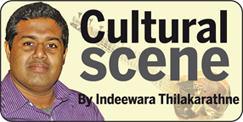Fools rush in...
 Deviating for a while from the topic of post colonial literature, I
thought of drawing your attention to the SLAM 2010, a literary seminar
held at the idyllic University of Peradeniya. The SLAM 2010 was
organised by the Student Welfare Society, Faculty of Arts together with
Readers without Borders. Deviating for a while from the topic of post colonial literature, I
thought of drawing your attention to the SLAM 2010, a literary seminar
held at the idyllic University of Peradeniya. The SLAM 2010 was
organised by the Student Welfare Society, Faculty of Arts together with
Readers without Borders.
On conclusion of the seminar, what struck me was the famous old adage
"Fools rush in where angels fear to tread". Before coming back to the
SLAM 2010 with its mysterious acronym, it is pertinent to find out how
this famous line came into being.
The maxim "Fools rush where angels fear to tread" was first written
by Alexander Pope in his poem An Essay on Criticism, albeit it has now
been widely used in diverse contexts.
An Essay on Criticism is one of the major poems by Alexander Pope
(1688-1744). Although the poem's title suggests a deep analysis, it is,
in fact, a compilation of Pope's reading of different "ancients". It is
obvious that the poem addresses not writer, reader but critic. The metre
of the poem is what known as heroic couplets.
Though the poem was written in 1709, it appeared in 1711. One can
learn from Pope's correspondence that most of Pope's ideas were
originally in prose form since 1706 and the poem, a verse essay was
written in the Horatian mode and primarily deals with how writers and
critics should behave in a literary commerce of the day. The poem
contains good criticisms and advice besides Pope's ideas on the subject.
In the opening couplets, Pope enunciates the idea that the bad
criticism causes more harm than bad writing. However, he stresses the
point that literature needs criticism for its own advancement:
'Tis hard to say, if greater Want of Skill
Appear in Writing or in Judging ill,
But, of the two, less dang'rous is th' Offence,
To tire our Patience, than mis-lead our Sense:
Some few in that, but Numbers err in this,
Ten Censure wrong for one who Writes amiss;
A Fool might once himself alone expose,
Now One in Verse makes many more in Prose (1-8)
Pope highlights critics' common faults, e.g., settling for easy and
cliché rhymes:
And ten low Words oft creep in one dull Line,
While they ring round the same unvary'd Chimes,
With sure Returns of still expected Rhymes.
Where-e'er you find the cooling Western Breeze,
In the next Line, it whispers thro' the Trees;
If Chrystal Streams with pleasing Murmurs creep,
The Reader's threaten'd (not in vain) with Sleep.. . . (347-353)
Part II of An Essay on Criticism includes with a famous couplet:
A little Learning is a dang'rous Thing;
Drink deep, or taste not the Pierian Spring:
The spring of Pieria in Macedonia is sacred to the Muses and the
first line of the couplet is often misquoted as "a little knowledge is a
dangerous thing".
Part II of the couplet is also the origin of the famous line:
To err is human, to forgive divine.
The line "Fools Rush in Where Angels Fear to Tread" which is from
Part III of the poem has become part of the popular lexicon.
SLAM 2010
The SLAM 2010 offered among other things a window of opportunity to
look into the culture of academic seminars in Sri Lanka and the content
that goes into them. The pertinent issue is the role of the University
in this particular context.
A university is supposed to produce knowledge and the academic's role
is definitely to do research and to contribute to the existing body of
knowledge. Students' role is manifold and they should also seek
knowledge and engage constantly in intellectual discussions aiming at
exploring gray areas in their chosen fields of studies.
On the first day of the SLAM, in the morning sessions, Writers Ameena
Hussein and Aiyathurai Santhan were featured and briefly discussed their
contribution to the growing cannon of Sri Lankan writings in English.
Although the quality, content and prosody of their writings drastically
vary from writer to writer and from one literary production to other,
the new literati's contribution is somewhat substantial.
However, the issue remains whether these literati, albeit some of
them are capable and gifted, would be able to reach international
literary market and carve a niche in a fiercely competitive environment.
Among the fundamental prerequisites for such an enlightened movement,
draw a line between fiction and faction, respecting fundamentals of
language such as grammar and syntax, writings in conformity with the
prosody of a given language whether it is Sinhalese, Tamil or English
and adhering to the fundamental norms of publishing are of paramount
importance.
The session titled "Post -War Sri Lankan Literature: Where to? Where
from?", was a thought provoking session. The fundamental issues such as
the very existence of post-war literature and whether the literati are
aware of the contentious issues associated with a protracted conflict
which lasted for three bloody decades were discussed.
So far the contribution to the Post-War Literature in Sri Lanka,
particularly, in literature in English is minuscule. The issues such the
fundamental dynamics of the conflict, politicising the core issues and
the aptness of the terminologies associated with the conflict have been,
so far, dealt partially or completely left out by the literati,
particularly, in English.
The use of term 'Post-war literature' is polemical in a way that it
would reinforce some of the much politicised issues of the conflict. In
my opinion, since major war had not been waged between two nations, the
term 'Post-War Literature' is misleading and inappropriate. It should be
rather "Post-Conflict Literature".
|

